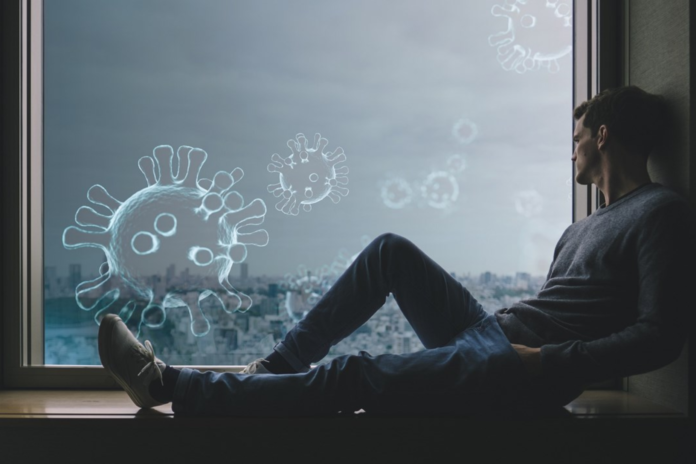(Foundation for Economic Education) — Loneliness among Americans has been growing in recent years, but the policy response to the COVID-19 pandemic has drastically exacerbated the problem. A new report by Harvard University researchers finds that 36 percent of Americans are experiencing “serious loneliness,” and some groups, such as young adults and mothers with small children, are especially isolated.
Researchers at the Harvard Graduate School of Education’s “Making Caring Common” project analyzed data from an October 2020 online survey of 950 Americans. “Alarming numbers of Americans are lonely,” they conclude in their paper, and those surveyed “reported substantial increases in loneliness since the outbreak of the pandemic.”
Young adults are the loneliest group. According to the research findings, 61 percent of young people ages 18 to 25 reported feeling lonely “frequently” or “almost all the time or all the time” during the four weeks preceding the fall survey. Forty-three percent of these young adults indicated that their loneliness had increased since the pandemic and related lockdowns began. These results echo similar findings of other Harvard researchers who found that nearly half of young adults were showing signs of depression amid the pandemic response. And in August, the CDC reported that one in four young adults in this age range had contemplated suicide during the month of June.
Mothers with small children were another group experiencing high rates of loneliness according to the recent survey analysis, with more than half of mothers reporting serious loneliness. Forty-seven percent of these mothers said that their loneliness increased during the pandemic response.
While everyone has been forcibly cut off from normal social interaction as a result of government lockdown measures, social distancing mandates, and other public health orders, young people and mothers with small children may be particularly harmed by these policies. In many cases, older teenagers and young adults have been unable to meaningfully connect with their peers during school closures and remote learning plans. Additionally, social distancing requirements on many college campuses have halted normal social interaction and can contribute to loneliness and depression among this cohort. As a fall semester article in BU Today, a publication of Boston University, explained: “BU’s aggressive coronavirus safety protocols — no large groups, fewer in-person classes and meetings, and restrictions on the amount of people allowed in an elevator, laundry room, and even around a dining hall table — can equal loneliness.”
For mothers with small children, being disconnected from other mothers, as well as lacking in-person support from family members and friends, can take its toll and make days with little ones seem even longer and more intense. Additionally, as the Harvard researchers found, periodic daycare and school closures have made the last year particularly challenging for mothers.
In their paper, the researchers cite developmental psychologist Niobe Way, who says: “We are in danger of alleviating one public health problem — the transmission of disease — while exacerbating another.” Indeed, economists have been pointing out these tradeoffs of the pandemic response since last spring. As FEE’s Antony Davies and James Harrigan wrote in April: “Regardless of whether we acknowledge them, tradeoffs exist. And acknowledging tradeoffs is an important part of constructing sound policy.”
Loneliness was worsening prior to the pandemic
Loneliness in America has been a mounting concern for decades. In his groundbreaking 2000 book, Bowling Alone, Robert Putnam documented the growing alienation of Americans, as previously robust aspects of civil society that fostered connection, such as bowling leagues, faded away.
More recent research showed that loneliness was worsening prior to the pandemic. In 2018, a joint Kaiser Family Foundation and Economist survey found that one in five Americans “often” or “almost always” felt lonely or socially isolated, and results from a large-scale Cigna report released in January 2020 found that three out of five Americans reported being lonely.
Lockdowns and related pandemic response measures amplified feelings of loneliness and isolation, as local businesses and organizations were shut down or forced to reduce capacity and change operating procedures. Restaurants, bars, coffee shops — even playgrounds — have been closed in many areas, limiting opportunities for social connection. Several states continue to restrict the number of people allowed in one’s own home, including Vermont where residents have been prohibited from interacting with anyone outside of their immediate household since November.
Not surprisingly, loneliness has deepened as a result of these lockdowns and restrictions that sever individuals from their communities, and mental health continues to deteriorate. Youth suicide and depression rates are increasing, and drug overdose deaths are climbing. The tradeoffs of these strict pandemic response policies are becoming increasingly clear.
Solutions to the loneliness epidemic
The most obvious solution to the accelerating loneliness epidemic during the pandemic response is to lift the lockdowns and related public health policies that keep people cruelly separated from one another.
In their new paper, the Harvard researchers acknowledge the impact of COVID-19 restrictions on increasing rates of loneliness but continue to endorse the current policy response, including indicating that we “may need to enter another lockdown phase as new variants spread.” They argue for sweeping efforts to combat the loneliness epidemic both during and after the pandemic response.
While the Harvard researchers acknowledge that individuals can take some action to ameliorate loneliness by identifying and reversing their own negative feedback loops, they focus most of their attention on a “collective” response to loneliness in America.
Specifically, they criticize what they call “this age of hyper-individualism,” saying that we must “restore our commitment to each other and the common good.” To achieve this, the researchers recommend “national, state, and local public education campaigns” that highlight the loneliness epidemic. They recommend that schools, colleges, and workplaces provide more resources to combat loneliness, and they urge a much larger role of government in this process. “The federal government should greatly expand its commitment to national service for young people, and state and local governments can do much more to promote many forms of organized service that bring people together to work on common problems,” the researchers state.
More pressingly, the study authors explain that we must shift from “Americans’ focus on the self” toward “the common good.” The undermining of the individual in favor of the collective, or “common good,” typically means empowering government with more authority to try to fix social problems. As the Nobel Prize-winning economist Milton Friedman said: “I think a major reason why intellectuals tend to move towards collectivism is that the collectivist answer is a simple one. If there’s something wrong, pass a law and do something about it … On the other hand, the individualistic or libertarian argument is a sophisticated and subtle one. If there’s something wrong with society, if there’s a real social evil, maybe you will make better progress by letting people voluntarily try to eliminate the evil.”
Still, the Harvard researchers are right to point out that the loneliness epidemic is a result of disconnection from community. Encouraging this community connection is a goal that can be best achieved through a robust civil society, or the non-governmental, voluntary institutions of our lives — such as extended family, church, clubs, sports leagues, and benefit societies — that have been tragically eroded at the same time that government has grown and taken on roles that were previously reserved for families and communities. An expanded role of government in trying to combat the loneliness epidemic, or any other social problem, will only make matters worse.
In his 1835 book, Democracy in America, Alexis de Tocqueville reflected on the vitality of American civil society. He wrote:
“Americans of all ages, all conditions, all minds constantly unite. Not only do they have commercial and industrial associations in which all take part, but they also have a thousand other kinds: religious, moral, grave, futile, very general and very particular, immense and very small; Americans use associations to give fêtes, to found seminaries, to build inns, to raise churches, to distribute books, to send missionaries to the antipodes…”
Tocqueville warned that as these voluntary institutions and associations become usurped by government power, individuals slowly lose their free will. He wrote: “Such a power does not destroy, but it prevents existence; it does not tyrannize, but it compresses, enervates, extinguishes, and stupefies a people, till each nation is reduced to nothing better than a flock of timid and industrious animals, of which the government is the shepherd.”
The steady rise of government influence in areas that were previously the domain of civil society has been documented most recently by Howard Husock in his book, “Who Killed Civil Society? The Rise of Big Government and Decline of Bourgeois Norms.” Husock explains how non-governmental organizations and community nonprofits increasingly rely on government funding that can dilute their local impact. He writes: “Thousands of organizations, which were once independent of the government and funded by their communities, are instead government contractors now. Today, the U.S. government enters into some 350,000 contracts with 56,000 nonprofit organizations. In doing so, our federal government has changed not only the source of funding — it has changed the character of civil society and its ability to serve local communities best.”
The loneliness that many Americans currently feel is heartbreaking. Big government’s ascent prior to the pandemic, and the role of government in responding to the pandemic with coercive measures, have contributed to and exacerbated the loneliness epidemic. Relying less on government and more on the voluntary fabric of civil society can make us all happier, healthier, and more connected to each other and to our communities.

















